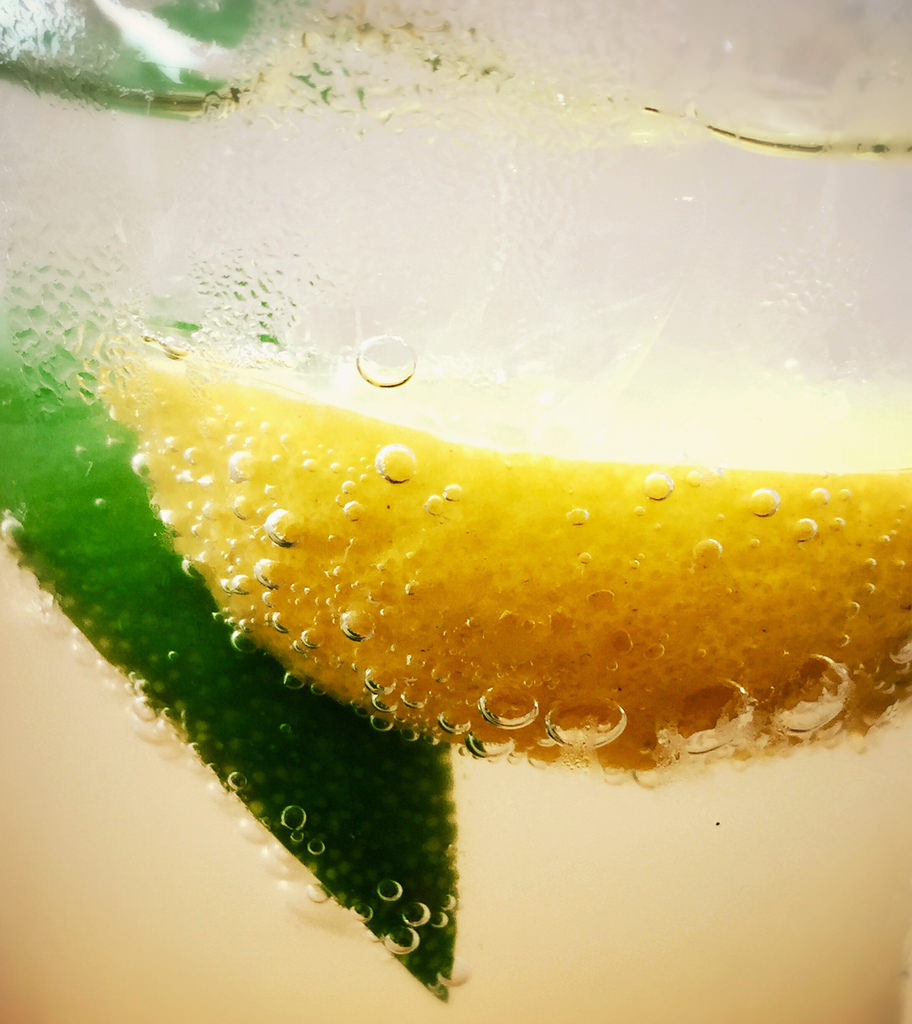What Is Eczema?
Eczema | Atopic Dermatitis
Overview
Eczema is a condition where patches of skin become inflamed, itchy, red, cracked, and rough. It is the most common form of inflammation of the skin (dermatitis).
The word eczema is also used specifically to refer to atopic dermatitis, the most common type of eczema. “Atopic” refers to a group of diseases in which there is often an inherited tendency to develop other allergic conditions, such as asthma and hay fever.
Some other common terms would be contact allergy and contact dermatitis.
In atopic dermatitis, the skin becomes extremely itchy. Scratching leads to redness, swelling, cracking, “weeping” clear fluid, and finally, crusting and scaling.
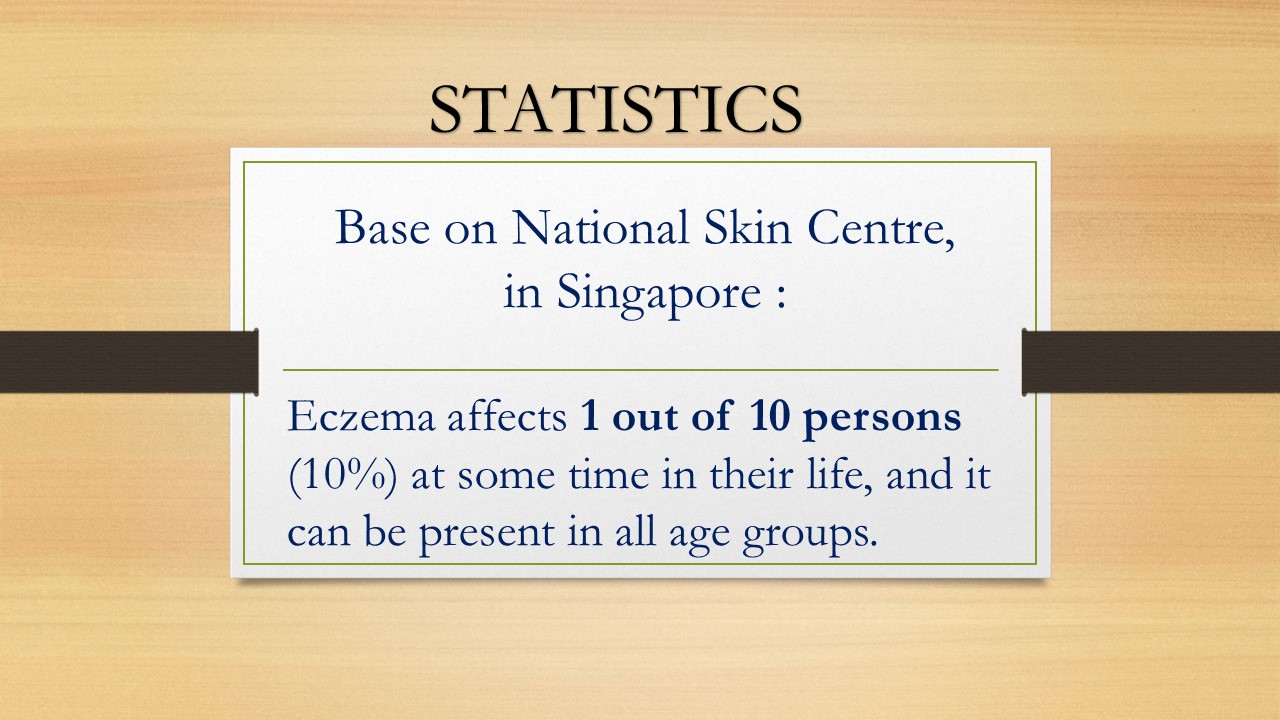
Symptoms
The most important thing to remember is that eczema and its symptoms are different for everyone. Your eczema may not look the same on you as it does on another adult, or on your child. It may even appear in different areas of the body at different times.
Eczema is usually itchy. For many people, the itch is usually only mild, or moderate. But in some cases it can become much worse and you might develop extremely inflamed skin.
Sometimes the itch gets so bad that people scratch it until it bleeds, which can make your eczema worse. This is called the “itch-scratch cycle.”
What to look for:
- Dry, sensitive skin
- Red, inflamed skin
- Very bad itching
- Dark colored patches of skin
- Rough, leathery or scaly patches of skin
- Oozing or crusting
- Areas of swelling
You might have all of these symptoms of eczema or only just a few. You might have some flare ups or your symptoms could go away entirely.
But the only way to know if you have eczema for sure, is to visit your doctor so he or she can look at your skin and ask you about your symptoms.
Here are some example of photos of eczema skin condition :

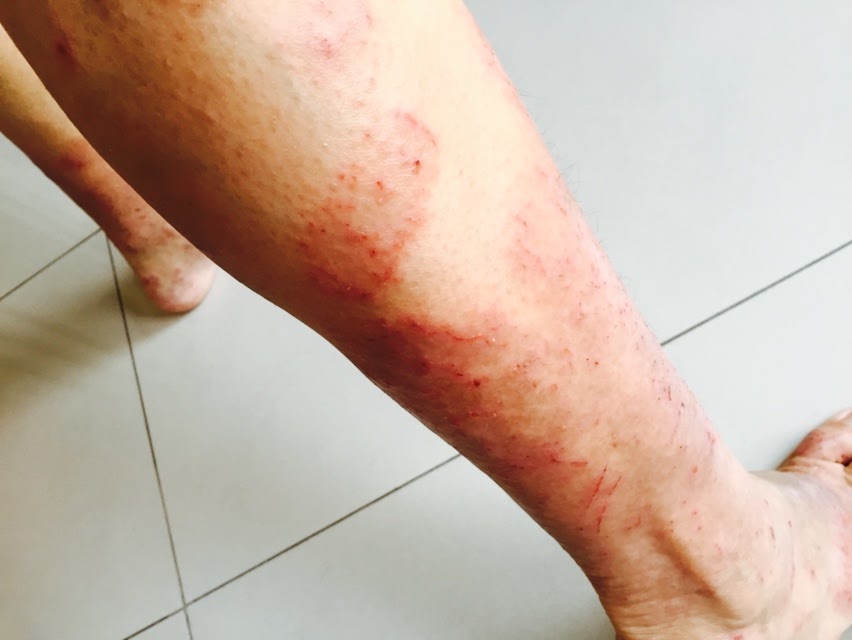
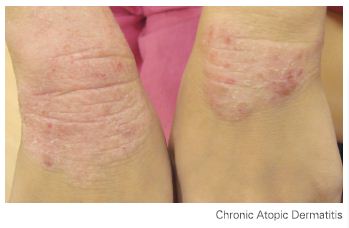
Possible Causes & Triggers
It is often frustrating for eczema sufferers because to be able to pinpoint the exact trigger takes a long time, observation, patience and sometimes even luck.
There are some everyday elements in your surroundings that might make you or your child’s eczema flare up, or get worse. These are called “triggers.”
Knowing your triggers will help you keep your symptoms under control. And the most effective way to avoid flareup is to be able to identify the “triggers”.
Here are some tip or guideline on where to start :
Dry Skin

Dry skin can be caused by diet, excessively dry or cold weather, contact allergy to chemical, hormonal imbalance and other skin and health disorders.
Other causes of dry skin include alcohol exposure as well as other irritants and allergens.
In cases of deep cracks, dry cracked skin can lead to infections.
Fortunately, you can control many environmental factors that cause dry skin. These factors include hot or cold weather, low humidity and soaking in hot water.
Ordinarily, dry skin isn’t serious, but it can be uncomfortable and unattractive, resulting in fine lines and wrinkles.
Severe dry skin conditions – an inherited group of disorders called ichthyosis – can sometimes be disfiguring and upsetting.
Prolong dry skin condition may also cause other secondary skin issues due to exposure to external irritants and chemical.
Irritants
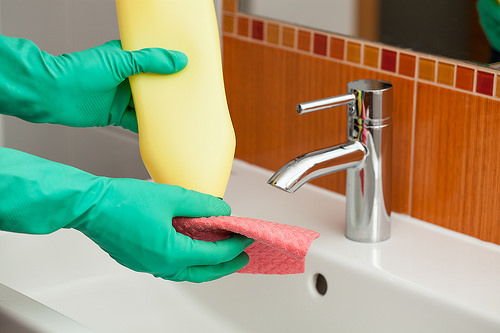
There are everyday products and even natural substances that can cause your skin to burn and itch, or become dry and red. These could be products that you use on your body or in your home — hand and dish soap, laundry detergent, shampoo, bubble bath and body wash, or surface cleaners and disinfectants.
In the commercial world, in order to be cost effective, cheaper but harsher chemicals are used to preserve the product. Paraben & methylisothiazolinone are 2 very common chemical ingredients that are now discovered to cause contact allergy or contact dermatitis for many people.
Rarely but it happens for very sensitive skin – even some natural liquids, like the juice from fresh fruit, vegetables, or meats, can irritate your skin when you touch them. Prawns (or preservative chemicals) are common cause of finger itching.
If you suspect that you are allergic to something you come in direct contact with, you may request your dermatologist to do a skin patch test.
In this test, they will select around 30 common chemicals that we come in contact commonly and leave it on your skin over a period of time (24-48 hours).
Thereafter the results are observed physically (redness/bumps) on the spot that the patch test was done.
Stress
Emotional stress is known to be associated with eczema. Some people’s eczema symptoms get worse when they’re feeling “stressed”. Others may become stressed, just knowing they have eczema, and this can make their skin flare up.
When the body isn’t overly stressed, the nervous system and sensory organs perform normally. But when the body becomes overly stressed from too frequent and/or dramatic stress responses (which we call stress-response hyperstimulation), the body, nervous system, and sensory organs can ‘misbehave’ and cause a wide range of nervous system and sensory symptoms, such as exhibiting a burning and itching skin sensation.
In addition, stress also causes our immune system to be imbalance and if you have sensitive skin, this may affect your skin’s immunity to over-react.
Extreme temperature

Most people with eczema will become itchy, or experience a “prickly heat” sensation when they sweat, or get too hot. This can happen when you exercise, wear too many clothes to bed, or when you quickly move from one extreme temperature to another (cold to hot). During the cold winter months, your skin may also get too dry — leading to irritation and an eczema flare up.
Allergens
There are everyday materials in the environment that can cause you to have an allergic reaction and trigger an eczema (or Atopic Dermatitis) flare up.
Some of the most common are: seasonal pollen, dust mites, pet dander from cats and dogs, mold and dandruff.
Allergens that cause symptoms to stick around a lot longer, or to come back, are much harder to pinpoint. It’s important to know the allergens that could cause a flare up, so that you can help keep your rash under control.
If you suspect that certain external allergen is causing your eczema, you may request your dermatologist to do a skin prick test to confirm.
Bacteria or Fungus Infection
A bacterium called Staphylococcus aureus, which thrives on weepy and broken skin, is very common in eczema. This bacterium is found on the skin of virtually everyone with atopic eczema, even when there are no signs of infection.
Infection with Staphylococcus aureus makes eczema worse, hinders healing and multiplies as the eczema becomes more severe.
Candida is one of the most common causes of fungal infections worldwide. Fungal infections are common in everyone, but people with eczema may be more vulnerable.
In small amounts, these fungi are helpful to help our digestive systems and absorb important nutrients. However, problems can arise if an overgrowth occurs.
Antibiotics promote yeast infections, including gastrointestinal Candida overgrowth, and penetration of the GI mucosa. Certain factors, such as prolonged antibiotic use, increase the risk for both men and women.
People with diabetes or impaired immune systems are more susceptible to yeast infections Back to Top
Treatment : Calm, Care, Heal
There are many articles and advice you can find with regards to treating eczema and dermatitis.
However, not all treatment will work for you. Why is that so? Because each individual has a unique skin condition due to the different root cause and triggers.
So in order to have a workable long term treatment, you have to find one that works for you systematically.
At loss on where to start and what to do? Here are some thought process and guidance to help you.
CALM down your skin
Depending on the condition of your skin at this point of time, you will need to calm it down differently.
If your skin is wounded, broken, infected – you will first need to calm it down by treating it. Wash with a mild antiseptic wash and apply topical antibiotic that the doctor prescribed.
If your skin is very dry, flaky, crusty – you will need to apply a hypoallergenic moisturizer that is ointment based after cleaning your skin.
If your skin is mildly dry and flaky – you will need to apply a shielding lotion after cleaning and patting your skin dry.
If the skin is very inflamed or infected and the rash is spreading, you may need to see a dermatologist first to get it treated. The skincare management and natural healing methods can come after. But when part of our organ is overloaded with virus/bacteria/histamine, it requires some form of medication to assist our body in the immediate short term.
CARE – Skincare Regime that works for you
People who are prone to eczema or dermatitis have skin barrier that has been compromised or sensitive. Therefore, it is important to treat your skin with tender loving care. Specific treatment that are of first priority is to attend to the root cause and “flare-up” triggers. If your skin reacts to :
- Extreme Dry Condition : Maintain a regular moisturizing routine after shower with a hypoallergenic moisturizer. Avoid bathing in very hot water. Avoid harsh or foamy soap because normal shower foams are very drying to the skin. If you go to low humidity countries, pack a hypoallergenic ointment-based cream to apply on the skin regularly.
- External irritants (eg. detergent) : Use latex or plastic gloves when you do washing. Use natural-based hand-wash and toiletries. Apply shielding lotion to protect your skin from external irritants in case you accidentally come in contact without awareness.
- Stress : Prolong stressful situation and anger can cause some people to start scratching. Manage your stress by exercising, yoga, meditation. Deep breathing several times a day helps to calm your emotion.
- Extreme Temperature : Avoid going out in the afternoon when the sun is at the peak. Keep your skin cool by applying aloe vera gel if you feel a heatrash coming. Carry an umbrella to protect from the UV rays. If you sweat a lot after exercising, cool down with a shower.
HEAL naturally
Long term healing treatments require patience and time before any improvement can be seen. Food is nature’s original medicine. Unknown to many, food plays a part in how our organs functions or malfunctions. It may not be the direct trigger of your eczema but food intolerance can cause skin irritation and rash.
Insufficient nutrient may also affect the skin’s appearance and barrier. And for some people, certain food can trigger histamine to be released which can aggravate your already inflamed skin.
ECZEMA DIET : You are what you eat! The secret to good health is achieved through right nutrition. Eczema diet is very simply – food choices that are scientifically and nutritionally proven to prevent and minimize itch and inflammation of the skin.
In selecting and avoiding the correct food, you will help your skin heal faster and avoid further aggravation.
Typically most of the alkaline-based & plant-based food are eczema friendly. However, there are some plant-based food that can cause itching eg. tomato, grapes, kiwi. You can read more about eczema diet HERE :
TRADITIONAL CHINESE MEDICINE (TCM) : TCM has been used as a natural long term treatment since ancient times by the Chinese ‘sinsehs’.
When our organs are not functioning as per expected, TCM believe that our body’s ‘yin-yang’ is imbalance. Therefore, they use herbs, acupuncture, acupressure to tweak the body’s deficient constituition to reach the ideal balance.
As per all other natural treatment, TCM treatment takes at least several visits/consultations before your body displays improvement. In order to ensure you are in a good TCM physician’s hand, you can refer to the MOH’s website on registered TCM practitioners.
SUPPLEMENTS for SKIN : Most of us live in a hectic day to day lifestyle and as a result, lack of essential nutrient may reflect in your skin. In addition, most food we eat now are highly processed, which strips off nutrients from the original food source. Therefore, you may need to consume supplements that can help your skin :
| Supplement | What is this? |
| Probiotics | Health-promoting bacteria strain, naturally found in the gastrointestinal tract of healthy people. Beneficial bacteria promote healthy digestion and they can manufacture some vitamins to minimize nutritional deficiency. |
| Quercetin | Natural antihistamine source, reduces blood histamine levels which is higher in people who are allergy prone. Potent antiboxidant flavonoid found in fruits and vegetable. |
| Flaxseed oil or flaxseed | These are small brown seeds best known for their rich content of anti-inflammatory omega-3 essential fatty acids. |
| Vitamin C | Water soluble vitamin, vital for the formation of collagen in the skin, protect against infections and is a natural antihistamine. |
NATURAL TOPICAL TREATMENTS : Many people with eczema use products and practices that are outside Western, or conventional, medicine to help manage their symptoms.
If you use these natural therapies with doctor-prescribed medications, you are using a “complementary” method to manage your eczema. If you are using natural therapies in place of conventional medicine, you are using an “alternative” method.
The following complementary and alternative therapies have been studied and found to benefit certain symptoms of eczema in adults. Check with your health care provider if you are interested in trying alternative therapies on your child’s eczema. Some of the popular natural or organic topical lotion/moisturizer :
- Papaw (carica papaya) ointment
- Olive oil
- Emu oil
- Argan oil
- Aloe vera gel
- Kakadu plum oinment (latest from Australia)
- Coconut oil
There are many other natural alternative therapy that have been tried by eczema sufferers to manage this condition. Do persevere and keep a positive mind and you will be able to eventually find a remedy that suit your skin. Good luck!
Sources and References:
1. National Institute of Arthritis, Musculoskelatal and Skin Disease : https://www.niams.nih.gov/Health_Info/Atopic_Dermatitis/default.asp
2. National Skin Centre Singapore : https://www.nsc.com.sg/Patient-Guide/Health-Library/Types%20of%20Skin%20Conditions/Pages/Eczema-and-Dermatitis.aspx
3. National Eczema Society : http://www.eczema.org/
4. National Eczema Association: https://nationaleczema.org/eczema/
5. Medical News Today: http://www.medicalnewstoday.com/articles/14417.php#causes_eczema
6. Anxiety Centre : http://www.anxietycentre.com/anxiety/symptoms/burning-itching-skin-anxiety.shtml
7. The Eczema Diet by Karen Fischer


